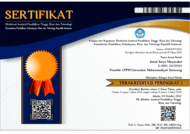Storytelling: Peningkatan High Order Thinking Skills Siswa Sekolah Dasar Negeri 03 Ujung-Ujung Pabelan Semarang
(1) Universitas Muhammadiyah Semarang
(2) Universitas Muhammadiyah semarang
(3) Universitas Muhammadiyah semarang
(4) Universitas Muhammadiyah semarang
(5) Universitas Muhammadiyah semarang
(6) universitas Muhammadiyah semarang
(*) Corresponding Author
Abstract
Students at Public Elementary School 03 Ujung-Ujung Pabelan learned English only in extracurricular activities, where grade 4 and grade 5 were joined in one class. The learning was done by memorizing vocabulary and learning the structure of English grammar. During extracurricular activities, students were not introduced to HOTS-based storytelling, they only learned English vocabulary and structures. Based on this explanation, students needed HOTS skills in learning English so that they can stimulate critical thinking skills in responding to reading and other English language materials. But in reality, they tended to memorize vocabulary and grammar relatively. Based on this statement, our service team focuses community service on the implementation of storytelling to increase student’s HOTS at 03 Elementary School Ujung-Ujung Pabelan Semarang, which had 42 students. The service method used is the lecture method, brainstorming, storytelling practice, and evaluation of the satisfaction of community service participants. The results show that the student’s HOTS in learning to read English stories, retelling what they had read, and increasing the students' critical thinking patterns. The students become motivated to retell story in English and the students improve their critical thinking patterns.
Keywords
Full Text:
PDFReferences
Anderson, L. W. and Krathwohl, D. R., et al. (Eds.) (2001) A taxonomy for learning, teaching, and assessing: A revision of Bloom’s taxonomy of educational objectives. Allyn & Bacon. Boston, MA (Pearson Education Group).
Bloom, Benjamin S., etc. 1956. Taxonomy of educational objectives: The classification of educational goals, handbook I cognitive domain. Longmans, Green and Co.
Concklin, W. (2012). Strategies for developing higher order thinking skills, grade 6-12. Shell Education.
Huffaker, D. (2004). Spinning yarns around the digital fire: Storytelling and dialogue among youth on the internet. Information Technology in Childhood Education Annual, 63-75.
Rohmadi, Muhammad. (2018). Strategi dan inovasi dalam pembelajaran bahasa dan sastra Indonesia di era industri 4.0. dalam Prosiding Pertemuan Ilmiah Bahasa dan Sastra Indonesia (PIBSI) Xl, 27-40. Program Studi Pendidikan Bahasa Indonesia, FKIP Universitas Sebelas Maret Surakarta.
Rosaline, Lisa. (2014). Teaching asian values through story telling activity in English as a Foreign Language (EFL) class. Jurnal Pendidikan Dompet Dhuafa, 4(2).
Setyarini, S., Bukhori, A.H., Rukmini, D., Yuliasri, I., Mujiyanto, J. (2018). Thinking critically while storytelling: Improving children’s HOTS and English oral competence. International Journal of Applied Linguistics. 8(1), 189-197.
Turner,T.N. (2010). How do we develop values. Retrieved from: http://www.education.com/ refence/article/develop-values/ diakses 7 September 2020 pukul 08.15.
Widaningsih, Ida. (2019). Strategi dan inovasi pembelajaran bahasa indonesia di era revolusi industri 4.0. Ponorogo: Uwais Inspirasi Indonesia.
Article Metrics
Abstract view : 465 timesPDF - 156 times
DOI: https://doi.org/10.26714/jsm.3.1.2020.7-14
Refbacks
- There are currently no refbacks.
Copyright (c) 2020 Jurnal Surya Masyarakat

Jurnal Surya Masyarakat (JSM) is licensed under Creative Commons Attribution-NonCommercial-NoDerivatives 4.0
------------------------------------------------------------------------------------------------------------------------
Jurnal Surya Masyarakat (JSM)
p-ISSN: 2623-0364; e-ISSN: 2623-0569
Published by: Lembaga Penelitian dan Pengabdian Masyarakat (LPPM) Universitas Muhammadiyah Semarang



.jpg)







.jpg)